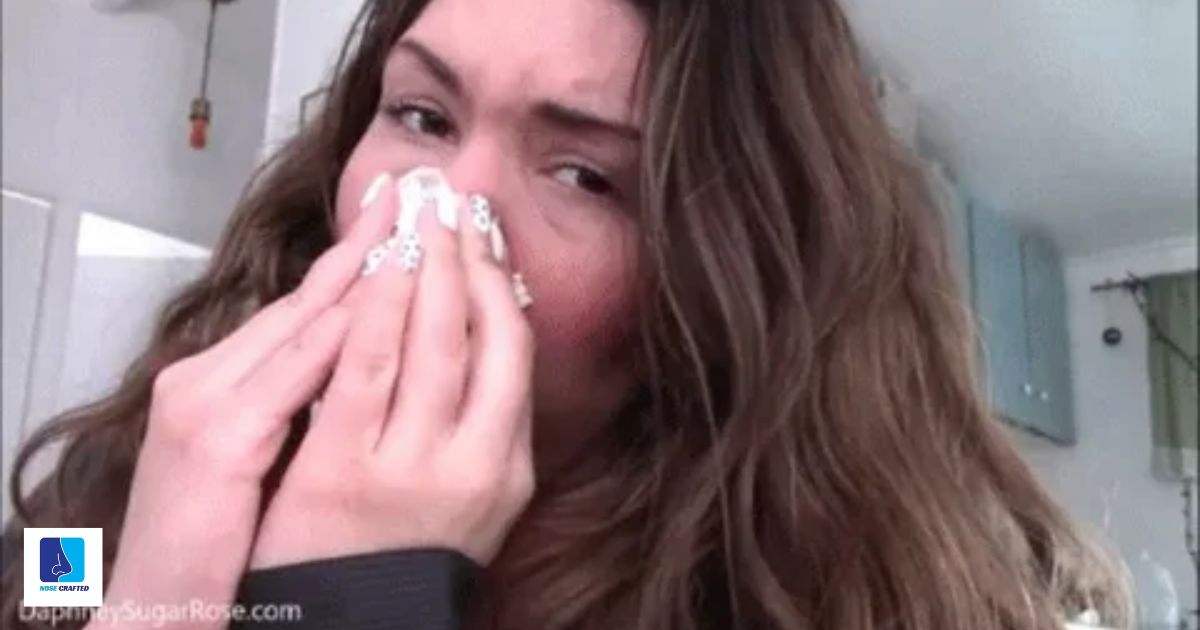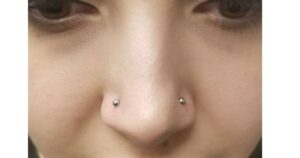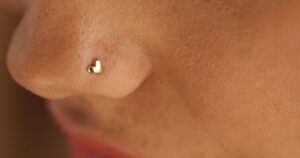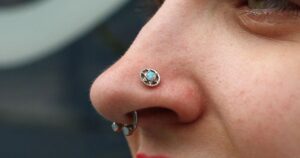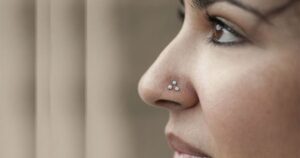You’ve just gotten a new nose piercing, and you’re excited to show it off. But then a thought strikes you: can I blow my nose? It’s a common concern among those with fresh piercings, as the last thing you want to do is damage your new adornment. Don’t fret; we’re here to clear the air on this matter and provide you with all the information you need to care for your nose piercing properly.
Imagine this: you finally muster the courage to get your nose pierced, endure the anticipation, and come out of the studio sporting a shiny new stud or hoop. But amidst the excitement, a sneeze threatens to ruin it all. Should you blow your nose? Let’s dive into the dos and don’ts to keep your piercing pristine.
Can I Blow My Nose After Getting It Pierced?

Your nose is a sensitive area, especially after piercing. Blowing your nose incorrectly can lead to complications such as irritation, infection, or even displacement of the jewelry. However, that doesn’t mean you have to suffer through a stuffy nose indefinitely. Here’s what you need to know:
Proper Technique for Blowing Your Nose
When you need to clear your nasal passages, adopt a gentle approach. Instead of forcefully blowing both nostrils simultaneously, opt for a one-nostril-at-a-time technique. Press a finger against one nostril while blowing gently through the other. This method reduces pressure on the piercing site, minimizing the risk of irritation or trauma.
Alternatives to Blowing Your Nose
If you’re concerned about blowing your nose, consider alternative methods to alleviate congestion. Nasal saline sprays or rinses can effectively flush out mucus without causing harm to your piercing. Additionally, staying hydrated and using a humidifier can help thin mucus, making it easier to expel naturally.
Precautions to Take
During the healing period, which typically lasts several weeks to a few months, prioritize the well-being of your piercing. Avoid activities that could potentially disrupt or damage the site, such as vigorous nose blowing, swimming in pools or hot tubs, or exposing the piercing to harsh chemicals or irritants.
Other Considerations for Nose Piercing Care
While blowing your nose is a primary concern, there are other aspects of nose piercing care to keep in mind to ensure optimal healing and longevity of your piercing.
Cleaning Routine
Maintain a regular cleaning routine to keep your piercing free from bacteria and debris. Use a saline solution or a gentle, fragrance-free soap to cleanse the area twice a day. Avoid harsh cleansers or alcohol-based products, as they can dry out or irritate the skin. Additionally, when traveling, have you ever wondered how body piercings can set off airport security?
Jewelry Selection
Choose high-quality jewelry made from materials such as titanium, surgical steel, or gold to minimize the risk of allergic reactions or infections. Ensure that the jewelry is the appropriate size and style for your piercing to prevent discomfort or complications.
Signs of Infection
Be vigilant for signs of infection, such as increased pain, swelling, redness, or discharge. If you suspect an infection, seek prompt medical attention to prevent it from worsening.
Just Got My Nose Pierced And Have A Runny Nose
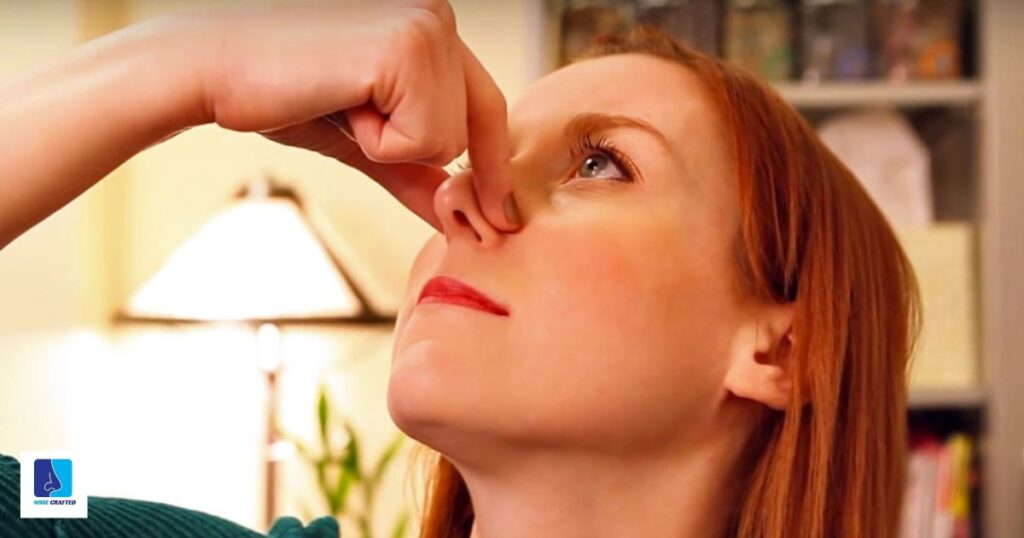
Certainly! Here’s a simple table addressing the concern of having a runny nose after getting a nose piercing:
| Concern | Recommendation |
| Runny Nose | 1. Be Gentle: Avoid vigorous blowing. Instead, gently press one nostril closed while blowing through the other. |
| 2. Use Saline Solution: Opt for nasal saline sprays or rinses to alleviate congestion without irritating the piercing. | |
| 3. Stay Hydrated: Drink plenty of water to keep mucus thin and easier to expel naturally. | |
| 4. Consider Humidification: Use a humidifier to add moisture to the air, which can help soothe nasal passages. | |
| 5. Seek Professional Advice: If you experience persistent discomfort or unusual symptoms, consult your piercer or a healthcare professional. |
Can Snot Infect A Nose Piercing
Yes, snot can infect a nose piercing if proper care isn’t taken. When you blow your nose, the mucus expelled can carry bacteria and germs, posing a risk of infection to the freshly pierced area. It’s essential to be gentle when dealing with a runny nose, as forceful blowing can irritate the piercing and introduce bacteria, leading to complications.
To prevent snot from infecting your nose piercing, avoid blowing your nose forcefully, especially during the healing period. Instead, use a gentle technique, such as pressing one nostril closed while blowing through the other. Additionally, keep the piercing clean and dry, and avoid touching it with dirty hands. If you notice any signs of infection, such as increased pain, swelling, or discharge, seek professional advice promptly to prevent further complications.
How To Blow Your Nose With A New Septum Piercing
Blowing your nose with a new septum piercing can be tricky, but it’s essential to do it gently to avoid irritation or damage. Firstly, use a tissue to cover both nostrils, then press gently against one nostril while exhaling softly through the other. Repeat the process for the opposite nostril, ensuring you don’t blow too forcefully or create too much pressure around the piercing area.
Remember, your septum piercing needs time to heal, so it’s crucial to be patient and gentle during this period. If you’re unsure about blowing your nose or experience any discomfort, consult your piercer for personalized advice. Additionally, consider using saline nasal sprays or rinses to help alleviate congestion without putting strain on your new piercing.
Can Nose Piercing Affect Your Sinuses
Getting a nose piercing might make you wonder: could it affect your sinuses? Well, the good news is that a properly done nose piercing typically shouldn’t directly impact your sinuses. The piercing needle goes through the fleshy part of your nose, not deep enough to reach your sinuses, which are located deeper within your skull.
However, it’s essential to take care of your piercing properly to prevent any complications that could indirectly affect your sinuses. For example, if your piercing becomes infected or irritated, it might cause swelling or inflammation in the surrounding area, which could potentially lead to discomfort in your sinuses. Therefore, practicing good hygiene and following aftercare instructions from your piercer can help ensure a smooth healing process and minimize any potential issues.
Stuffy Nose After Nostril Piercing
If your nose feels stuffed up after getting a nostril piercing, don’t panic. It’s a common reaction as your body adjusts to the new addition. Your piercing might be sensitive to excess mucus production, making your nose feel congested. But fear not, there are ways to ease the discomfort.
Try not to blow your nose too hard, as this can irritate the piercing. Instead, use a gentle technique by pressing one nostril closed while softly blowing through the other. You can also use saline solution to help clear your nasal passages without causing harm to your piercing. Remember, patience is key as your body heals, and if you have concerns, don’t hesitate to reach out to your piercer for guidance.
When You Get Your Nose Pierced Does It Have To Be A Stud
When you first get your nose pierced, it’s common for piercers to use a stud. This is because studs are generally more secure during the initial healing period. They have a flat back that sits snugly against the inside of your nostril, reducing the risk of irritation or snagging. Plus, studs come in various styles and materials, allowing you to choose one that suits your taste and piercing location.
However, whether you have to keep a stud in your nose piercing ultimately depends on your preference and the advice of your piercer. Once your piercing has healed, usually after several weeks to months, you may opt for different types of jewelry, such as hoops or rings. Just make sure to select jewelry that is appropriate for your healed piercing size and shape to ensure comfort and longevity.
FAQ,s
Can I use a tissue to blow my nose?
Yes, you can use a tissue, but be gentle. Avoid excessive pressure or rubbing against the piercing site.
When can I resume normal activities like blowing my nose vigorously?
It’s best to wait until your piercing has fully healed, which typically takes 6-12 months. Consult your piercer for personalized advice.
What if I accidentally blow my nose too hard?
If you experience increased pain, bleeding, or other unusual symptoms after blowing your nose, take a break from blowing your nose and monitor the situation. If symptoms persist or worsen, seek professional assistance.
Conclusion
Your nose piercing is a beautiful expression of your individuality, but it requires proper care to ensure its longevity and your comfort. While blowing your nose may seem like a trivial concern, it’s crucial to approach it with caution during the healing process. By following the guidelines outlined above and listening to your body, you can enjoy your new piercing without worry. So, the next time you feel a sneeze coming on, remember: gentle blows for a happy nose!
